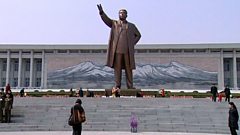Why Music? Live from Wellcome Collection
Tom Service discovers how music is used to manipulate and control, from music as a tool to subdue or intimidate, to the subconscious role music plays in our daily lives.
Last on
More episodes
Previous
![]()
Exploring what makes music a vital part of being human.
Clips
-
![]()
Music in Dictatorships - Jang Jin-sung
Duration: 09:15
-
![]()
Meditative Music
Duration: 09:18
-
![]()
Music in Torture
Duration: 10:05
-
![]()
Music and Empathy - Professor Eric Clarke
Duration: 10:17
Chapters
-
Panel discussion
Duration: 03:02
Music and pain relief
Duration: 08:40
Panel discussion
Duration: 05:30
Music under dictatorships
Duration: 09:35
Panel discussion
Duration: 05:06
Music in torture
Duration: 10:42
Panel discussion
Duration: 12:50
Power of meditative music
Duration: 09:54
Panel discussion
Duration: 01:14
Why Music?: Live from the Wellcome Collection: Manipulating the Mind
In a special live edition of Music Matters from Radio 3's pop-up studio at Wellcome Collection, Tom Service discovers how music can be used to manipulate or control patterns of behaviour. He is joined byΒ Professor Paul Robertson, composer Claudia Molitor and music therapist Dr Simon Procter, who discuss new research into how music can be used to control pain during surgery, the controversial use of music in torture, how music can affect our shopping choices, how music can increase our levels of empathy and how it can be used in dictatorships.
From music as a tool to control physical pain, or as a means to intimidate, to the subconscious role music plays in our daily lives, the programme will look at historical and present-day examples and delve into the science behind music's manipulative effect on the brain.
Music as Pain Relief
![Music as Pain Relief]()
Dr Catherine Meads (pictured) of Brunel University, Elizabeth Ball, surgeon at the Royal London Hospital and Daisy Fancourt, researcher at the Centre for Performance Science at the Royal College of Music, explain the findings in recent trials into the healing power of music, and particularly how music can be used to aid patients before, during and after surgical procedures.
Music under dictatorships
![Music under dictatorships]() Jang Jin-sung is the one-time poet laureate of Kim Jong-il but defected to South Korea in 2004.Β As a child, his mother had hoped for him to become a concert pianist.Β Through his translator, Shirley Lee, Jang Jin-sung gives Music Matters a revealing account of how music is used to control a whole people under dictatorship in North Korea.Β
Jang Jin-sung is the one-time poet laureate of Kim Jong-il but defected to South Korea in 2004.Β As a child, his mother had hoped for him to become a concert pianist.Β Through his translator, Shirley Lee, Jang Jin-sung gives Music Matters a revealing account of how music is used to control a whole people under dictatorship in North Korea.ΒMusic in torture
![Music in torture]() With historical and contemporary accounts of music used in torture, musicologists Suzanne Cusick and Morag Grant explain the far-reaching psychological and physical effects of music on those who have survived torture to tell their tales: from the torture practices of the Middles Ages to the current War on Terror, and from South America to the Nazi Concentration Camps.
With historical and contemporary accounts of music used in torture, musicologists Suzanne Cusick and Morag Grant explain the far-reaching psychological and physical effects of music on those who have survived torture to tell their tales: from the torture practices of the Middles Ages to the current War on Terror, and from South America to the Nazi Concentration Camps.Power of Meditative Music
![Power of Meditative Music]() Visiting the Buddhapadipa Temple in South West London, we experience the use of chanting in Buddhist ceremonies, and Professor Keith Howard and composer Rolf Hind explores the effects that meditative and religious music has on mind and body.Β Β
Visiting the Buddhapadipa Temple in South West London, we experience the use of chanting in Buddhist ceremonies, and Professor Keith Howard and composer Rolf Hind explores the effects that meditative and religious music has on mind and body.Β ΒMusic and empathy
![Music and empathy]()
Psychologist of music, Professor Eric Clarke, talks to Tom Service about his current research trials to explore how music can increase our levels of empathy towards others.
Credit
Role Contributor Presenter Tom Service Broadcasts
- Sat 26 Sep 2015 13:00Βι¶ΉΤΌΕΔ Radio 3
- Mon 28 Sep 2015 21:45Βι¶ΉΤΌΕΔ Radio 3
Music and Empathy - Professor Eric Clarke
Knock on wood – six stunning wooden concert halls around the world
Steel and concrete can't beat good old wood to produce the best sounds for music.
The evolution of video game music
Tom Service traces the rise of an exciting new genre, from bleeps to responsive scores.
Why music can literally make us lose track of time
Try our psychoacoustic experiment to see how tempo can affect your timekeeping abilities.
Podcast
-
![]()
Music Matters
The stories that matter, the people that matter, the music that matters













